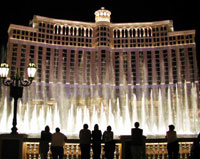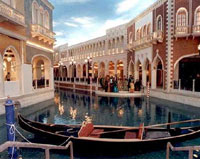美国城市-拉斯维加斯
(单词翻译:单击)
Las Vegas (U.S.)
|
The only natural feature to account for the location of Las Vegas is a spring north of downtown. Once used by Paiute Indians on their seasonal2 visits to the area, it was re-discovered by Mexican scout3 Rafael Rivera in 1829. The area became known to overland travelers as las vegas - 'the meadows' - a place with reliable water and feed for horses. Las Vegas became a regular stop on the southern emigrant4 route to California, the Spanish Trail. In the 1850s, Mormons(摩门教徒) built the town's first structures, a small mission(教堂) and fort(堡垒); the fort became a ranch5 house(低矮的平房), but there was little development until 1902, when much of the land was sold to a railroad company. The area that is now downtown was subdivided6 when the tracks came through, with 1200 lots sold on 15 May 1905 alone - a date now celebrated7 as the city's birthday. As a railroad town, Las Vegas had machine shops, a good number of hotels, saloons and gambling8 houses. The railroad laid off(解雇) hundreds in the mid9 1920s, but one Depression-era development gave the city a new life. The huge Hoover Dam(胡佛水坝)project commenced in 1931, providing jobs and growth in the short term and water and power for the city's long-term growth. Also in 1931, Nevada legalized gambling and simplified its divorce laws, paving the way for the first big casino, El Rancho, which was built by Los Angeles developers and opened in 1941. The next wave of investors10, also from out of town(乡下), were mobsters like Bugsy Siegel, who built the Flamingo11 in 1946 and set the tone for the new casinos - big and flashy, with lavish12 entertainment laid on to attract high rollers(挥金如土的人).
Today Las Vegas boasts 19 of the world's 20 largest hotels, attracts 33 million visitors per year, earns over US.25 billion in annual gaming revenue, and marries over 100,000 people each year. There are other cities witih terrific entertainment and gaming opportunities, but there is no place in the world like Las Vegas, and no city even pretending to be. |
 收听单词发音
收听单词发音
1
gulch

|
|
| n.深谷,峡谷 | |
参考例句: |
|
|
|
2
seasonal

|
|
| adj.季节的,季节性的 | |
参考例句: |
|
|
|
3
scout

|
|
| n.童子军,侦察员;v.侦察,搜索 | |
参考例句: |
|
|
|
4
emigrant

|
|
| adj.移居的,移民的;n.移居外国的人,移民 | |
参考例句: |
|
|
|
5
ranch

|
|
| n.大牧场,大农场 | |
参考例句: |
|
|
|
6
subdivided

|
|
| 再分,细分( subdivide的过去式和过去分词 ) | |
参考例句: |
|
|
|
7
celebrated

|
|
| adj.有名的,声誉卓著的 | |
参考例句: |
|
|
|
8
gambling

|
|
| n.赌博;投机 | |
参考例句: |
|
|
|
9
mid

|
|
| adj.中央的,中间的 | |
参考例句: |
|
|
|
10
investors

|
|
| n.投资者,出资者( investor的名词复数 ) | |
参考例句: |
|
|
|
11
flamingo

|
|
| n.红鹳,火烈鸟 | |
参考例句: |
|
|
|
12
lavish

|
|
| adj.无节制的;浪费的;vt.慷慨地给予,挥霍 | |
参考例句: |
|
|
|
13
bent

|
|
| n.爱好,癖好;adj.弯的;决心的,一心的 | |
参考例句: |
|
|
|
14
backwards

|
|
| adv.往回地,向原处,倒,相反,前后倒置地 | |
参考例句: |
|
|
|

 Las Vegas is in the southern part of the state of Nevada, about 50 miles east of the California border and 30 miles west of the Arizona border. The city is divided into two main parts: a compact downtown called Glitter
Las Vegas is in the southern part of the state of Nevada, about 50 miles east of the California border and 30 miles west of the Arizona border. The city is divided into two main parts: a compact downtown called Glitter  The glitter that brought in the high rollers also attracted smaller spenders, but in larger numbers. Southern California provided a growing market for Las Vegas entertainment, and improvements in transport made it accessible to the rest of the country. Thanks to air conditioning and reliable water supplies, Vegas became one of the country's most popular tourist destinations. In recent years, Vegas has
The glitter that brought in the high rollers also attracted smaller spenders, but in larger numbers. Southern California provided a growing market for Las Vegas entertainment, and improvements in transport made it accessible to the rest of the country. Thanks to air conditioning and reliable water supplies, Vegas became one of the country's most popular tourist destinations. In recent years, Vegas has 


